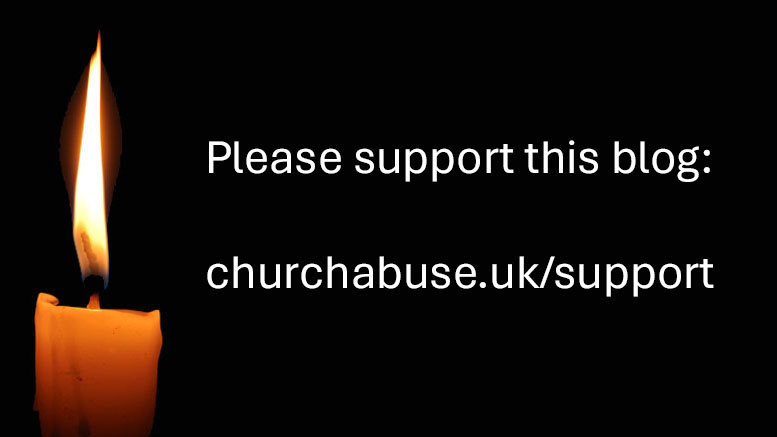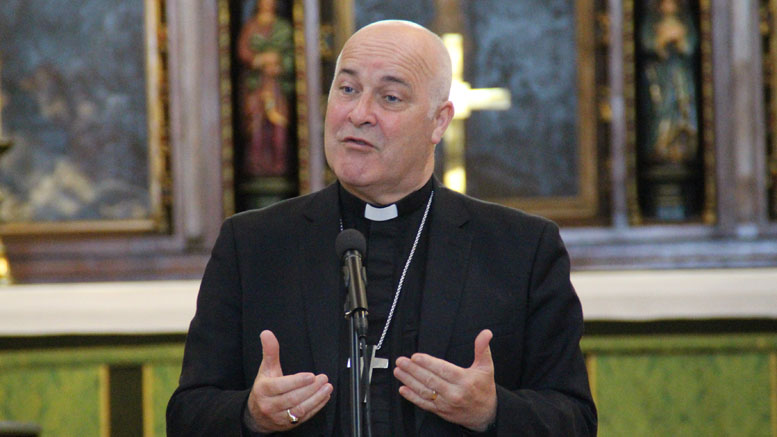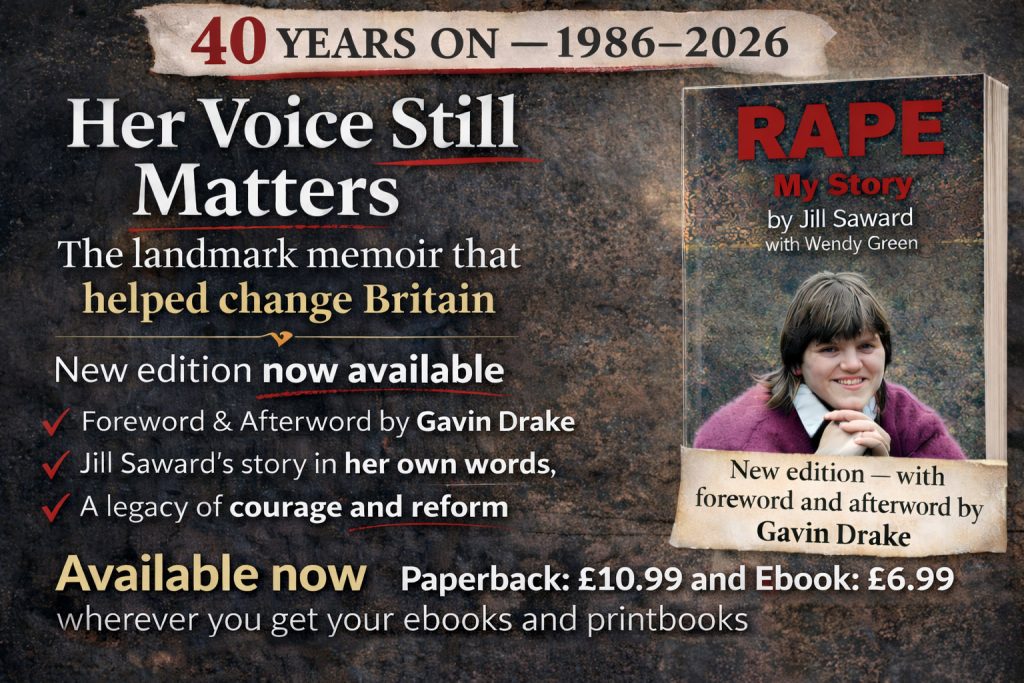Regular readers will know that the Church of England used to have a problem with safeguarding, and didn’t know how to deal effectively with allegations of abuse, didn’t know how to respond well to victims and survivors; and prioritised its own institutional reputation over the needs those who have suffered abuse at the hands of clergy and senior lay people in the Church.
Of course, all that changed at the General Synod in February, which was described in advance by Archbishop of York Stephen Cottrell, other bishops, and Archbishops’ Council staff as a “watershed moment” on safeguarding, a chance to put everything right, and that the Church had finally learned the lessons that it had studiously ignored over several recent decades.
Yes. I’m being facetious. Nothing has changed.
This week the Church of England announced the membership of the Crown Nominations Commission (CNC) – the body that will select Justin Welby’s successor as Archbishop of Canterbury.
We already knew that Archbishop Cottrell was on the commission. I don’t know what to think of this: here is somebody with a woeful track record on safeguarding helping to select somebody to succeed someone who had to step down because of safeguarding failings. The fact that he is on the Commission means that Cottrell can’t be considered for the role. So that’s good, but at 66 years of age (67 by the time the appointment would take place) he was likely to be too old to be considered anyway, considering the mandatory retirement age of 70 for bishops (including archbishops) in the Church of England.
His membership of the Commission also means that he is likely to turn a blind eye to any safeguarding failings of potential candidates. We know this because it is a matter of public record that this is exactly what he has done in the past.
It would be entirely appropriate – and I think very helpful – if Archbishop Cottrell were to recuse himself from any meetings of the Crown Nominations Commission dealing with the selection of the next Archbishop of Canterbury, while also making clear that he would not accept any nomination for the role.
The Archbishops’ Council has announced that its National Safeguarding Team and the Dioceses of Chelmsford and Southwark have commissioned a Safeguarding Practice Review in the case of David Tudor – this will inevitably look at Archbishop Cottrell’s own woeful actions in this case – actions which he has subsequent found to have lied about in media statements. While this review is ongoing, it is an appalling position that Cottrell should be helping to choose somebody to fill an archiepiscopal seat left vacant because the previous holder resigned because of safeguarding failings.
With all this in mind, if the Church of England really has used its “watershed moment” on safeguarding to put everything right and to learn the lessons it has studiously ignored over several recent decades, then it would surely be right for Cottrell to step down from any aspect of selecting the next Archbishop of Canterbury.
Has the Church of England learned its lessons?
Am I just harping on about things that have happened in the past, before the “watershed moment”?
This week I received a press release and a copy of an open letter from the “ISB Survivors Group”. A quick re-cap: when the Archbishops’ Council disbanded its “Independent Safeguarding Board” (ISB) for being, er, “independent”, it promised that it would continue to support those victims and survivors that the ISB had been working with and would continue to progress the promised independent reviews into their cases and how they have been treated by the Church of England.
That was two years ago. They are still waiting for their reviews.
I publish below a copy of their press release and their open letter to the Archbishop of York Stephen Cottrell. Reading this, one wonders whether the Archbishop should not only recuse himself from the CNC, but should also be suspended from ministry to prevent him from carrying on the re-abuse of victims and survivors.
PRESS RELEASE FROM THE ISB SURVIVORS GROUP
Survivors of Church Abuse Demand Action from the Archbishop of York
The ISB Survivors Group has today issued the attached open letter to the Archbishop of York.
We are survivors of abuse within the Church of England. We are the very individuals who were promised independent reviews by the Church, following the Independent Inquiry into child sexual abuse (IICSA). Many of us had already begun our reviews through the Independent Safeguarding Board (ISB) — until the Archbishops’ Council abruptly dismissed the ISB Board Members, halting the process and denying us the justice we were due.
Our group includes IICSA core participants, survivors of Bishop Peter Ball, and victims of John Smyth, amongst others. Some of us have been battling for our complaints — including those against senior bishops and Archbishops’ Council members — to be heard for over 30 Years.
It has now been almost two years since the dismissal of the ISB Board. No meaningful or credible alternatives for resuming our reviews have been proposed. While the Archbishop of York has agreed to meet with us, he continues to refuse discussion of the very issues we need to address.
For 23 months, we have been left without any independent support. The Church’s proposed “independent” support included individuals closely connected to the National Safeguarding Team (NST) — a blatant conflict of interest. The “independent” advocate assigned to survivors worked directly for the Church of England. One other complication is that the Archbishop of York’s own behaviour would be subject to scrutiny in the very reviews that he is effectively preventing from progressing.
We are exhausted by the Church’s failure to act and by what we perceive as manipulative stalling from both the Archbishop of York and the deeply discredited National Safeguarding Team. The re-abuse and cruelty needs to stop.
Our lives have already been shattered by horrific, sadistic, and systemic abuse. We will not tolerate continued mistreatment from an institution that professes to follow Christ.
An Open letter to The Archbishop of York and Archbishops Council
Dear Archbishop Cottrell,
STRICTLY WITHOUT PREJUDICE
We are in receipt of your communication sent to Dame Jasvinder Sanghera in early February and after much consideration individually, as well having met as a group, are now ready to reply.
All of us agreed that the best word to describe your letter was “abusive” and that consequently need to say that we find that it impossible to see Jesus in you.
Your abusive letter has made us realize that if we were to engage any further with you, even with the assistance of others, or to engage with your fellow members of the Archbishops’ Council, their agents (let alone your utterly discredited and menacing national safeguarding staff), that there is a substantial risk that it might be seen by others as a sign that it was perhaps safe for them to engage with you in any way. However, it is very clear to us, having read and deliberated upon the contents of your letter, that there is a very high risk that you potentially expose us to experiencing substantially worse further trauma that would cause us (already victims of sexual and spiritual abuse from your organization) irreparable and in some cases even mortal harm.
Archbishop Cottrell, we see you as a diabolical monster bent on causing us further harm and after receiving your letter we shall not communicate with you, your colleagues or agents any further: quite simply we do not believe it would be safe for us to do so. Consequently, we strongly advise any other vulnerable man, woman or child also to keep away from you and your discredited organization – one that seems to delight in its core business of causing ever-increasing violence against those who are vulnerable.
You use the word “robust” to describe safeguarding in your church, however your often repeated use of this word merely means to us an escalation in the abuse that we continue to receive from you and your business organization. For many of us, we see in you an individual worse than Bishop Peter Ball or John Smyth – indeed some of us wonder whether your desire to harm us is based in a similar perversion of Jesus and His love.
Christians are supposed to show the Light of Christ but in you, Archbishop Cottrell, we see merely darkness – no doubt your insistence to meet with Dame Jasvinder Sanghera and Mr Reeves “on a private and confidential basis” would also be held by you in the dark – a refuge to which you are perhaps unseemingly more inclined than the Light of Jesus.
Finally, as for your “apologies to all survivors for the trauma they have experienced” and that you wish to “seek to find a way forward to minimize any further trauma to the group” (failing to mention seeking to address the substantial harm you, your colleagues and business agents have already caused), from our own experience we simply do not believe a word of it and never will – nor arguably should anyone else.
We suggest that you appoint a TRULY Independent Alternative Dispute Resolution (ADR) to move things forward URGENTLY.
Yours sincerely,
The ISB SURVIVORS GROUP



As a member of the ISB Survivors Group, I can confirm we get NO SUPPORT whatsoever from the church. Quite the opposite. We use phrases such as Car Crash and Diabolical Monster as these are the same phrases that the Church has used to describe their own safeguarding.
As a member of the ISB Survivors Group and a Christian, I’m finding it increasingly impossible to engage with the Church of England. Trust has been shattered—again and again. I’ve lost count, but I think I’m on apology number 38 after enduring their broken, bureaucratic, and deeply flawed internal processes.
I’m still waiting for a scrap of scripture from them—something to justify their bizarre practices and corporate-style damage control that feels anything but Christlike. When—and if—the redress scheme ever materialises, I hope investigators scrutinise the files of the lawyers, civil servants, and insurers who worked harder to protect the Church’s reputation than to support those of us who came forward in pain.
This is a problem across the whole Anglican Church in the UK. See my post below.
It’s disgusting !
How can we ever expect the next generation to
walk forward into the Church of England,
It’s a sad sad situation and unless an independent group take over to sort this mess the abuse won’t stop.
Exactly! This is what UK Anglicanism needs.
My experience is that the safeguarding team has gone mad in disciplining members of the church who have received spurious trivial complaints.
Yes! Please see my post below. An inability to deal with real villains is matched by attacking victims.
The potential slow death of the UK Anglican Church is accelerated by the incompetence of Archbishops like the Church of Ireland’s John McDowell. There is a great mass of evidence of abuse and bullying cover up in Down and Dromore Diocese not being addressed. ‘Primate’ McDowell needs to stop his ‘monkeying’ and fix up an independent inquiry into bullying and abuse cover-ups.
I saw 2 out of 5 New Wine trainees in my ministry training group leave Down and Dromore Diocese. This was after a woeful failure to follow the clearest trail imaginable of bullying and harassment, with senior professional witness testimony not taken proper account of: a Cambridge-educated female professor, a senior schoolmistress, a recently retired medic. They witnessed a New Wine trainee cry for hours in my home immediately after emerging from a meeting with a New Wine course tutor.
The middle-aged male victim was in floods of tears and claimed to have felt accused of adultery in foul language: “Any of us might fancy a change of breasts”. Should Bishop David McClay be asked to formally apologise to innocent people who felt unfairly hounded out of his diocese while he was Archdeacon, and unfairly accused of sexual misconduct in the crudest imaginable language?
A further ex-New Wine student trainee features in this 30-1-22 posted ‘Olive Tree Media’ film about growth and revival in a Down and Dromore parish in east Belfast: ‘Karl Faase interviews Joe Turner for Jesus the Game Changer Season 2’ The opening scene has shocking images for a film about a UK Anglican parish [ ***It looks more like something from a promotional film about Hamas!***]. There is not much talk about this film by any Church of Ireland bishops or archbishops.
What else are you allowing to get hidden Archbishop McDowell, and do multiple victims of savage ill-treatment in Down and Dromore Diocese deserve an unreserved apology? Does a problem with New Wine ill-treatment of interns possibly extend far beyond Canon Mike Pilavachi MBE? I saw a disgraceful contempt for UK law and agreed Anglican Church principles, which was combined with blasphemous contempt for biblical principles of justice. A top flight senior Church leader, from outside the Anglican Church, intervened and pleaded with victims to rescue themselves from further risk of abuse by immediately leaving the Down and Dromore Diocese.
I am a retired NHS medic and presently serve as a judicial panel member. There is self-evidently kangaroo court justice at work in what I witnessed, with multiple innocent victims (business people or senior professionals) feeling unfairly accused of sexual misconduct. I have shared my concern with Bishop Joanne Grenfell, and specifically asked her to share my communications with Archbishop Cottrell. Alas, the Archbishop has failed to respond to me, in spite of clear requests for a personal response or acknowledgement. What a woeful lack of brains and manners! What chance do child, teenage or young adult victims have of a fair hearing, if senior professionals are ignored?
Archbishop Cottrell’s presence on the Crown Nomination Board is a slap in the face to countless victims of ill-treatment. He should be forced to resign on account of the David Tudor scandal alone.
1) ‘File on 4 Investigates: Stalker in the Church’ *WORTH SHARING WIDELY?*
2) BBC 27.6.25 ‘Archbishop retires amid cathedral behaviour failings’. Church in Wales leader is gone.
3) ‘A preacher asked me out. When I turned her down, the stalking began’ BBC 29.6.25.
Joan Baez and ‘Where Have All the Flowers Gone?’ has this line: “When will they ever learn?”………………
Perhaps, never, in the case of our clay-footed and know-all Anglican Bishops and Archbishops……
Time for independent inquiry into bullying
Hinckley Times letter on 9 Jul 2025
A preacher asked me out. When i turned her down, the stalking began (BBC website 29.6.25) exposes alleged bullying cover-up in a Leicester Church of England parish. Should the current Bishop of Leicester
face a formal inquiry, or potentially even be asked to resign?
I am a retired medic and a parttime judge. I witnessed evidence of savage ill-treatment of ministry trainees in 2017. I reported this to bishops and archbishops. Eight years later there is no sign of any formal inquiry. Why did trainees on a ministry training course (overseen by the New Wine group and St John’s College Nottingham) face foul abuse?
Kangaroo court justice and DARVO [Deny-Attack-Reverse-Victim & Offender] sees countless Anglican Church bullying victims dismissed as “troublemakers”. The need for fully independent bullying inquiry processes-not overseen by our bishops or dioceses-is plain to all: except perhaps for our Bishops and Archbishops!
James Hardy by email
DAVID McCLAY (Anglican Bishop of Down and Dromore) helps me better understand toxic male leadership. He cynically covered up savagely violent ill-treatment of two out of five 2015-2016 Anglican trainees in my New Wine course year group.
A New Wine tutor accused us of sexual misconduct in foul language. The first incident saw a prof-medic-teacher all witness a student (a middle-aged businessman/farmer) cry for ages in my living room. The shocked and shaking man described feeling accused of adultery, and told “Any of us might fancy a change of breasts”.
The prof and I were astounded, and wondered if it could really be true. Just weeks later, however, the same New Wine tutor accused me of sexual misconduct (with the professor). David McClay has failed to protect the victims and deliver justice, even in the face of the most compelling evidence of savage bullying and harassment.
The professor-teacher-medic-farmer, all faithful communicant Anglicans, left Down and Dromore Diocese in disgust. KRWLAW (a Belfast legal firm) also express concerns relating to David McClay in an online post: ‘Neely abuse: Church of Ireland Bishop ‘apologises’ for unnamed rector – ignores Belfast-Tipperary transfer’. Can David McClay never accept the need to address savage Anglican bullying-harassment-abuse and its cover up?
Multiple Belfast locals have now drawn my attention to the acute and sinister disappearance of yet another ex-New Wine student. ‘Olive Tree Media’ posted this 12 mins YouTube film on 30.1.22:-‘Karl Faase interviews Joe Turner for Jesus the Game Changer Season 2’-.
But was Joe Turner long vanished, from the parish website and Facebook pages, when this promotional film (gushing with positive emotion) was posted? And can David McClay stand over the opening image sequence, featuring hooded men in balaclavas with armalites? It looks more like a Hamas film than a promotional film about Church of Ireland mission!
Should Bishop David McClay be asked to retire and resign? That’s a question I am posing for Archbishop John McDowell, Irish Anglican Primate. There’s also a problem for the Irish Primate himself, if he cares to follow Church news. The Welsh and English Primates have both had to acutely depart recently in disgrace. Today’s Anglicans are much less tolerant of toxic masculinity, or bullying-harassment-abuse cover ups by Bishop Clay-Foot & Co.